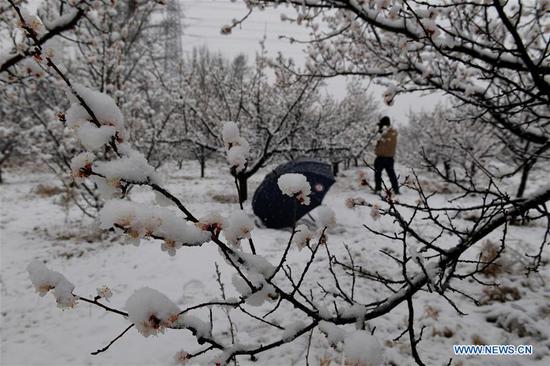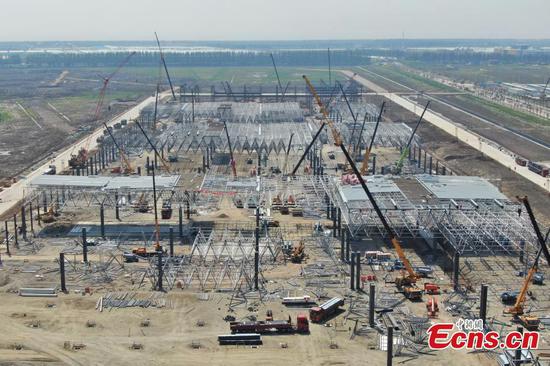
Potential homebuyers examine property models at a real estate firm in Chongqing. (Photo by Sun Kaifang/For China Daily)
Young people in failing marriages are usually determined to divorce, even if they have difficulty dividing or selling their homes. However, when middle-aged and older couples encounter relationship problems, the challenge of rocketing property prices means they usually choose to abandon the idea of splitting up, according to experts.
"Sky-high house prices in big cities make it hard for some couples to split their apartment in two, which forces them to continue their broken relationship and continue to live together," said Shu Xin, director of the Weiqing Group, a relationship counseling agency in Shanghai.
Lu, a 65-year-old Shanghai native who preferred to only give her surname, said her marriage became rocky soon after she gave birth to her daughter three decades ago, because her husband began to think he was not the girl's biological father.
"Fights and quarrels became part of our daily life, but we didn't separate because I wanted to give my daughter a comfortable home during her teenage years," Lu said.
For decades, she and her daughter have lived in separate bedrooms, while her husband lives in the sitting room.
The family does not even eat meals together. "He cooks every day, and after he finishes cooking, each of us chooses some food from the kitchen and takes it to our separate rooms to eat," she said.
A year ago, Lu's husband requested a divorce, but sky-high housing prices made that almost impossible, she said, adding that their apartment, in the heart of Xujiahui, one of Shanghai's best-known commercial and shopping centers, is valued at about 7 million yuan ($1.04 million).
"If we sold the apartment and divided the money, we could only buy a small apartment each in the suburbs. We are used to life here; it's very convenient for hospitals and close to relatives' homes. Moreover, our daughter, who is single, lives with us and works nearby," Lu said.
Zhang Lili, 67, said that if she and her husband could divide their house satisfactorily, they would have divorced about 10 years ago because of sharp differences in personality and her mother-in-law's endless involvement in their everyday life.
The couple owns an apartment worth nearly 4 million yuan in Shanghai's Putuo district. Their son has been away home for more than a decade, and he is currently working in Japan.
"We were both laid off in the late 1990s. It's impossible for either of us to pay 2 million yuan to the other or spend more than 3,000 yuan a month to rent a new place," she said.
In their 60-plus-square-meter home, they occupy separate bedrooms, and there are two electric cookers in the kitchen along with two rubbish bins. There are two bins in the bathroom, too.
Fang Mo, chief relationship and marriage counselor at the dating website baihe.com, said the fact that unhappy middle-aged and elderly couples are more prone to staying together is related to the traditional belief in conservative choices and the traditional sense of shame associated with divorce.
"Moreover, people born in the 1950s and '60s usually have a strong sense of the collective and family. They pay more attention to what other people in a group are feeling, while the single-child generation born in the 1980s and '90s care more about their individual feelings," she said.
Soaring house prices have also resulted in more middle-aged and senior lonely hearts, who are seeking love after a divorce or the death of their spouse, opting to cohabitate - something quite unthinkable in conservative Chinese tradition - rather than undertaking a registered marriage, according to relationship experts.
In the past five years, at least 80 percent of seniors seeking a permanent partner said they would choose to move in together rather than remarry, according to dating agencies. That means many alternate between homes and also keep their finances separate, mainly because of overwhelming objections from children on both sides.
"The intention of the majority of those who don't remarry is to prevent future problems, mainly regarding the division of property after death. The upsurge in house prices in recent years has seen property wrangles become a main source of complaints among the younger generation," said Huang Huiming, who has worked for a professional matchmaking agency in Shanghai for 20 years.


















































